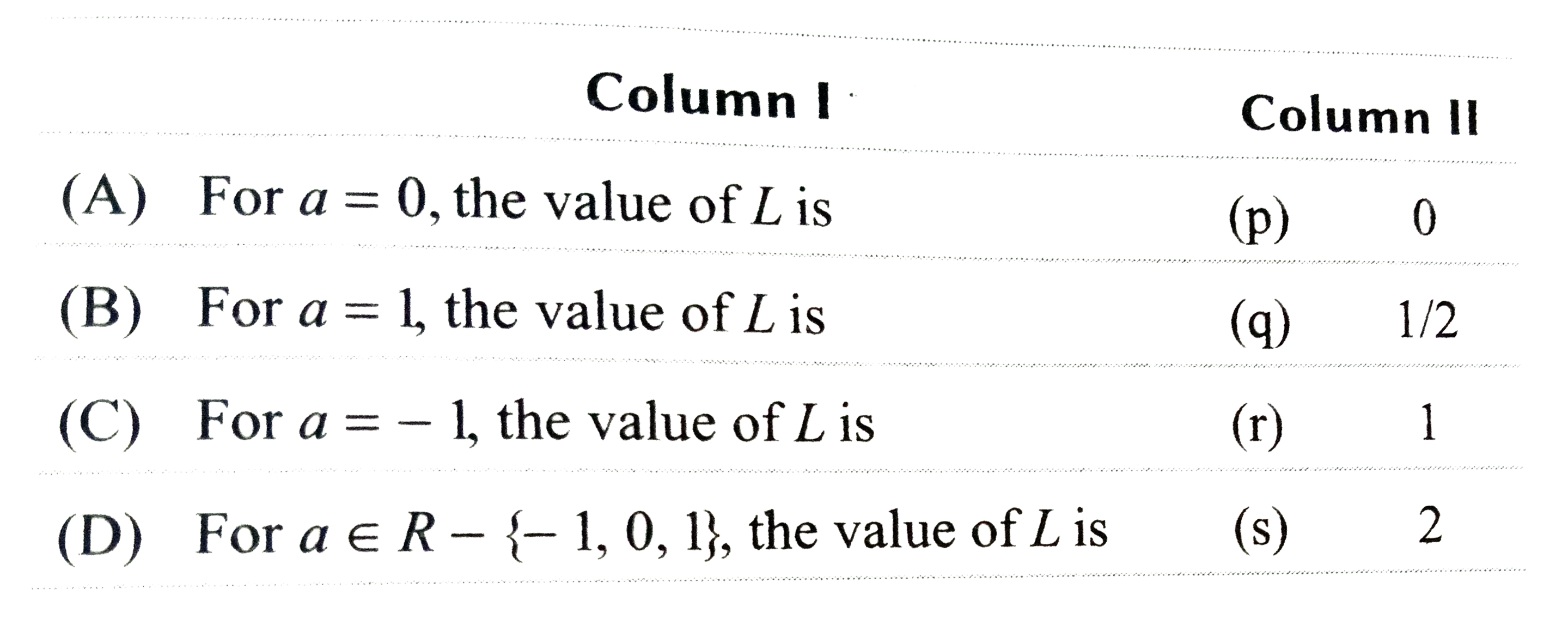f(x)=∫x0(4t4−at3)dtandg(x) is quadratic satifying g(0)+6=g'(0)−c=g''(c)+2b=0.y=h(x) intersect in 4 distinct points with abscissae xi,i=1,2,3,4 such that ∑ixi=8,a,b,c∈R+ and h (x)=f' (x).
'a' is equal to Solution in Punjabi
6
8
20
12
The correct Answer is:C
Step by step video & image solution for f(x)=int_(0)^(x) (4t^(4)-at^(3)) dt and g(x) is quadratic satifying g(0)+6=g' (0)-c=g'' (c)+2b=0.y=h(x) intersect in 4 distinct points with abscissae x_(i), i=1,2,3,4 such that sum(i)/(x_(i)) =8,a,b,c in R^(+) and h (x)=f' (x). 'a' is equal to by Maths experts to help you in doubts & scoring excellent marks in Class 12 exams.
Updated on:21/07/2023Topper's Solved these Questions
- DEFINITE INTEGRALBOOK - ARIHANT MATHSCHAPTER - DEFINITE INTEGRALEXERCISE - Exercise (Matching Type Questions)
4 Videos
- DEFINITE INTEGRALBOOK - ARIHANT MATHSCHAPTER - DEFINITE INTEGRALEXERCISE - Exercise (Single Integer Answer Type Questions)
4 Videos
- DEFINITE INTEGRALBOOK - ARIHANT MATHSCHAPTER - DEFINITE INTEGRALEXERCISE - Exercise (More Than One Correct Option Type Questions)
10 Videos
- COORDINATE SYSTEM AND COORDINATES BOOK - ARIHANT MATHSCHAPTER - COORDINATE SYSTEM AND COORDINATES EXERCISE - Exercise (Questions Asked In Previous 13 Years Exam)
7 Videos
- DETERMINANTS BOOK - ARIHANT MATHSCHAPTER - DETERMINANTS EXERCISE - Exercise (Questions Asked In Previous 13 Years Exam)
18 Videos
Similar Questions
Let limT→∞1T∫T0(sinx+sinax)2dx=L, then

View SolutionIf f(x)=∞∑n=1sinnx4nand∫π0f(x)dx=log(mn), then the value of (m+n) is ….
View SolutionIf f(x)=[sin−1(sin2x)] (where, [] denotes the greatest integer function ), then
View SolutionIf a vertex of a triangle is (1, 1) and the mid-points of two side through this vertex are (-1, 2) and (3, 2), then centroid of the triangle is
View SolutionIf a2+b2+c2=−2, and f(x)= ∣∣ ∣ ∣∣1+a2x(1+b2)x(1+c2)x(1+a2)x1+b2x(1+c2)x(1+a2)x(1+b2)x1+c2x∣∣ ∣ ∣∣ , then f(x) is a polynomial of degree
View SolutionLet F(x)=f(x)g(x)h(x) for all real x,wheref(x),g(x),andh(x) are differentiable functions. At some point x0,F′(x0)=21F(x0),f′(x0)=4f(x0),g′(x0)=−7g(x0), and h′(x0)=kh(x0). Then k is________
View SolutionLet f(x)andg(x) be two functions which are defined and differentiable for all x≥x0. If f(x0)=g(x0)andf′(x)>g′(x) for all x>x0, then prove that f(x)>g(x) for all x>x0.
View SolutionIff(x)andg(x) be two function which are defined and differentiable for all x≥x0. If f(x0)=g(x0)andf′(x)>g′(x) for all f>x0, then prove that f(x)>g(x) for all x>x0.
View SolutionConsider f g and h are real-valued functions defined on R. Let f(x)-f(-x)=0 for all x in R, g(x) + g(-x)=0 for all x in R and h (x) + h(-x)=0 for all x in R. Also, f(1) = 0,f(4) = 2, f(3) = 6, g(1)=1, g(2)=4, g(3)=5, and h(1)=2, h(3)=5, h(6) = 3 The value of f(g(h(1)))+g(h(f(-3)))+h(f(g(-1))) is equal to
View SolutionLet f(x)=e^(x)g(x),g(0)=4 and g'(0)=2, then f'(0) equals
View SolutionLet f and g be differentiable functions such that: xg(f(x))f'(g(x))g'(x)=f(g(x))g'(f(x))f'(x)∀x∈R Also, f(x)>0 and g(x)>0∀x∈R∫x0f(g(t))dt=1−e−2x2,∀x∈R and g(f(0))=1,h(x)=g(f(x))f(g(x))∀x∈RNow answer the question:f(g(0))+g(f(0))= (A) 1 (B) 2 (C) 3 (D) 4
View SolutionStatement I if f(0)=a,f'(0)=b,g(0)=0,(fog)'(0)=c then g'(0)=cb. Statement II (f(g(x))'=f'(g(x)).g'(x), for all n
View Solutionf(x)=∫x0(4t4−at3)dtandg(x) is quadratic satifying g(0)+6=g'(0)−c=g''(c)+2b=0.y=h(x) intersect in 4 distinct points with abscissae xi,i=1,2,3,4 such that ∑ixi=8,a,b,c∈R+andh(x)=f'(x).
f(x)=∫x0(4t4−at3)dtandg(x)
View SolutionIf f(x)=f(4−x),g(x)+g(4−x)=3 and ∫40f(x)dx=2, then : ∫40f(x)g(x)dx=
View SolutionFind a linear approximation for the following functions at the indicated points.
(i) f(x)=x3−5x+12,x0=2
(ii) g(x)=√x2+9,x0=−4
(iii) h(x)=xx+1,x0=1
View SolutionIf f(x), g(x) and h(x) are polynomials of degree 4 and
∣∣ ∣ ∣∣f(x)g(x)h(x)abcpqr∣∣ ∣ ∣∣=mx4+nx3+rx2+t is an identity in x,then
∣∣ ∣ ∣∣f''(0)−f''(0)g''(0)−g''(0)h''(0)−h''(0)abcpqr∣∣ ∣ ∣∣ is
View Solution
